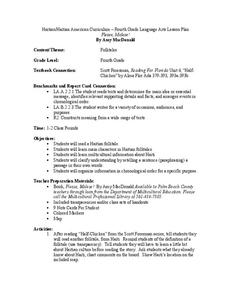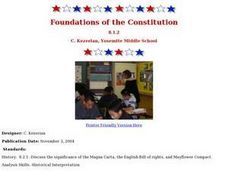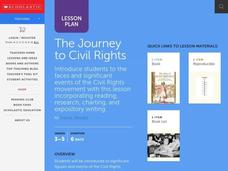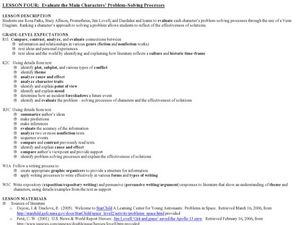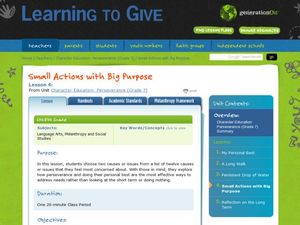Pennsylvania Department of Education
6 Traits: Word Choice
Students explore language arts by participating in a vocabulary usage activity. In this word choice lesson, students read examples of great word usage in literature and discuss with the class why some words appear stronger than others....
Pennsylvania Department of Education
6 Traits: Sentence Fluency
Students practice writing with sentence fluency in order to make the story more enjoyable for the reader. In this sentence fluency lesson plan, students focus on rhythm and flow.
Pennsylvania Department of Education
6 Traits: conventions
Students watch a video and write using conventions. In this conventions lesson plan, students edit their writing for the correct spelling, grammar, and paragraph usage.
Curated OER
Folktales
Fourth graders read a Haitian folktale. They study main characters in Haitian folktales and explore multicultural information about Haiti. They clarify understanding by retelling a sentence (paraphrasing) and a passage in their own...
Curated OER
Photo Essay
Students examine the process of writing a photo essay. They examine and select a personal photo or photo from a magazine, and brainstorm a story that can go with the photo. They identify an emotion to go with their picture, then write...
Curated OER
Create Your Island Paradise
Sixth graders create a descriptive essay and map describing their island paradise. They try to evoke the reader's senses: seeing, hearing, touching, smelling, and tasting. They revise their paragraphs using their partner's feedback.
Curated OER
Harriet The Spy
Fourth graders investigate the style of diary writing as its own genre of literature. They read Harriet The Spy in order to have a text for this literature study. Students use the skill of prediction to preview the story, and then...
Curated OER
Exploring Ecosystems
Fourth graders investigate ecosystems. In this ecosystem instructional activity, 4th graders explore producers, consumers, and decomposers and study the interdependence of each.
Curated OER
Dynastic Explorations
Students complete a unit of lessons on medieval Chinese dynasties. They examine the impact the Chinese culture has had on their own lives, label maps, conduct research, read stories, create bamboo stick sentences, write poems, and make...
Curated OER
Narrative Prompt - Lesson 2
Second graders review the structure of a narrative piece of writing. Individually, they write a narrative based on their best day of school. After being read different stories, they share their own narratives with the class. They are...
Curated OER
Reviewing Literary Elements
Students identify the elements of fiction, and work on compare and contrast skills.. In this comprehension instructional activity, students read different versions of Cinderella. Students use a Venn diagram to compare and contrast the...
Curated OER
Chance Dance Compositions
Fourth graders create dances through a randomly generated process (such as throwing a dice) and perform their dances for the class. Class work is based on Merce Cunningham's "Chance Dance" and includes walking, skipping hopping, and...
Curated OER
In the News
Third graders participate in a instructional activity that helps to improve reading comprehension. They move through several activities that help them understand how to express their opinions, support their statements and communicate...
Curated OER
Phonological Awareness and Rhyming
Students listen to a story and chime whenever they hear rhyming word pairs. Students generate other rhyming words that rhyme with each pair from the story. Students draw and/or paint illustrations to go along with a rhyming song given....
Curated OER
Foundations of the Constitution
Eighth graders explore the Magna Carta and the Mayflower Compact.
Curated OER
Historical Success Stories: Banneker, Blackwell, Drew, and Faraday
Fourth graders investigate how all races and religions have contributed to US history by looking at the scientists Elizabeth Blackwell, Benjamin Banneker, Charles Drew, and Michael Faraday. They research these scientists individually and...
Curated OER
The Journey to Civil Rights
Young scholars investigate the concepts that surround the Civil Rights Movement. They conduct research with the help of the teacher and use chart paper to create posters about major people involved. Students also complete a timeline...
Curated OER
Dinosaurs and George Washington: The Concept of old and new
Students read stories about the past and present and discuss the concept of old and new. In this old and new lesson plan, students discuss what makes something old and what makes it new by using stories as a reference.
Curated OER
Evaluate the Main Characters? Problem-Solving Processes
High schoolers read passages from several sources and evaluate the text for various criteria. In this problem solving lesson, students evaluate character problem solving processes after reading passages. They will use a Venn Diagram to...
Curated OER
The Experience of Diary Writing
Students read sections of Mackenzie King's diary. King was the Prime Minister of Canada during WWII. They relate the importance of keeping a diary.
Curated OER
Character Education-Perseverance
Students learn what it means to stick to a task through the re-telling of the story, "The Little Engine That Could." Personal application is made to their own experiences with the completion of, "I think I can..." endings.
Curated OER
Persuasive Speech
Tenth graders participate in a lesson that is focused on the concept of writing persuasive speechs. They conduct research from a variety of sources in order to gather information to write well informed speeches.
Orange County Department of Education
Integrity and a Boy Called Slow
Fifth graders identify the character trait of integrity in the main character, Slow, in "A Boy Called Slow." They participate in a discussion to determine what steps the main character took to earn his new name. Students write an essay...
Curated OER
Peer Editing
Sudents read and critique three of their fellow classmates' science fiction short stories on three consecutive days for mechanics, short story elements, style, and informational elements.





